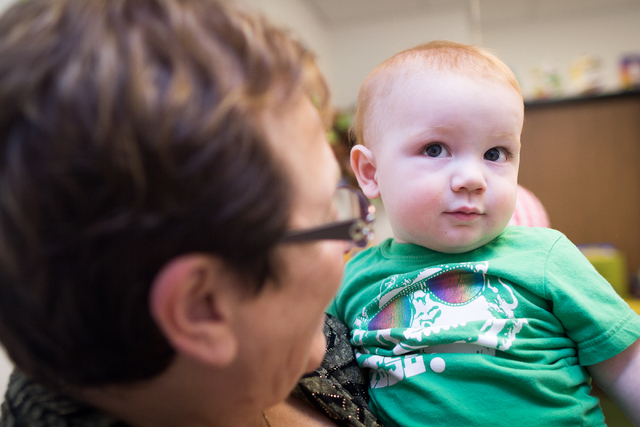Official wants to make Shenker Academy stand out

Linda Specht’s work is never done.
As director of the Shenker Academy, a preschool in Summerlin, Specht stays busy even when school’s out. She’s working now with her staff on the curriculum for the upcoming school year and hosting several daily tours for prospective families. She’s also in the middle of running summer camp and overseeing fall registration for the school, which has half- and full-day preschool and kindergarten programs for children ages 1 to 5 years.
To take the Shenker job, the longtime Jewish educator came out of a retirement that included writing a new Haggadah, or Passover seder text, and volunteering as a court-appointed special advocate to help abused or neglected children find safe and healthy permanent homes. Moving to Las Vegas was a natural: Her son Shai, a rabbi and Jewish educator, lives here.
Even though every day on the job is different, Specht most looks forward to one thing: Greeting her students as they arrive at school or camp.
“Just getting hugs and smiles from the children as they walk in makes the rest of the day great,” she said.
Question: What drew you to early childhood education?
Answer: It’s an amazing age where they learn so much, and they have so much to teach us, too, if we listen to them. Young children’s growth is so quick, and I bond with them.
Question: What have small children taught you?
Answer: They’re open-minded, so they’re willing to listen. From ages 3 to 5, they think things through in a different way, and it comes out very simplistically. They can talk to us without all of the extra things we put into what we’re thinking.
Question: You spent a good part of your career in religion-oriented schools. Why did that appeal to you?
Answer: I lived in Israel for many years and worked with youth there. When I came to the United States, one of my driving motivations was to teach the children their identity, not in so much a religious way, but in their identity and connection with Israel and a people. That has always been important to me.
Question: How is Shenker Academy different from other places you’ve worked?
Answer: It’s a school that’s connected to a temple (Temple Sinai), but it’s nondenominational. Beyond that, there aren’t many differences. We’re still trying to teach the children to be ethical and moral, so I think it’s basically the same, unless you take away teaching the history and traditions of a people. Here, we celebrate all traditions.
Question: What are the biggest issues with prekindergarten education in general?
Answer: We don’t challenge the children enough. We think because they’re small we need to address their education in a different way. I think even though they’re young, they’re capable of more than we think.
Also, developmentally, there are changes today. Children are wired differently. I see the children on iPads and iPhones, and they just have a normal instinct to use them. It’s a different world, and we need to understand that.
It’s important that every child be given the opportunity to have an early education experience. Some of them aren’t given that experience. They miss the social interaction, and they miss being able to experiment with different subjects, such as science and math. If they don’t have that experience, they miss that opening of minds to the world around them, and that’s what we’re trying to accomplish here.
More effort needs to be put into early childhood education, because ages 3 to 5 are the formative ages that affect their future. I think nationwide, it might make a difference when children get to elementary and high school. Learning is lifelong, and that’s what we should be teaching them now — that this is a lifelong experience.
Question: What are your goals at Shenker?
Answer: I would like to make this school stand out. The children learn languages here. They learn sign language, Spanish and Hebrew. They learn to be healthy. We’ve started summer camp with Krav Maga (an Israeli martial art), yoga and other exercises, and the children are going to follow the program throughout the year with exercise every day. Childhood obesity is a big topic these days, so we’re definitely going to continue with physical exercise.
I want to make early childhood education exciting for the children, and to communicate with parents and have them be part of the process. I want parents to be able to see the curriculum and give their input. We have to remember they are part of the process, too.
I know my staff is so excited about working on the curriculum. They’re growing and their minds are opening. I can feel that excitement, and that will go back into the classroom.
Question: One of your biggest accomplishments was heading the school for Congregation B’nai Jeshurun on Manhattan’s Upper West Side. Why did you leave?
Answer: That was the height of my career, because I had reached wherever I thought I could go in my career as a Jewish educator. It’s an amazing place, the work they do there — there’s lots of social action, and it was just an amazing opportunity. This was a place I had always admired.
But I couldn’t stand New York. It was so expensive, and the noise and the hub-bub were just too much for me. I was there for two years, and I was almost paying to work there. My husband and I looked at each other and said, “This isn’t working.”
Contact reporter Jennifer Robison at jrobison@reviewjournal.com. Follow @J_Robison1 on Twitter.